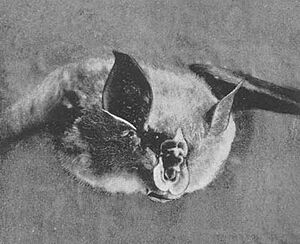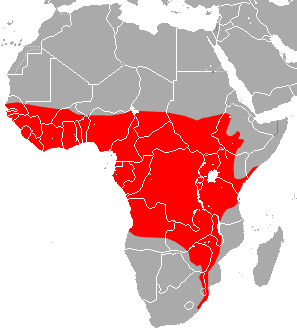Lander's horseshoe bat facts for kids
Quick facts for kids Lander's horseshoe bat |
|
|---|---|
 |
|
| Conservation status | |
| Scientific classification |
|
| Kingdom: | Animalia |
| Phylum: | Chordata |
| Class: | Mammalia |
| Order: | Chiroptera |
| Family: | Rhinolophidae |
| Genus: | Rhinolophus |
| Species: |
R. landeri
|
| Binomial name | |
| Rhinolophus landeri Martin, 1837
|
|
 |
|
| Lander's horseshoe bat range | |
| Script error: The function "autoWithCaption" does not exist. | |
| Synonyms | |
|
|
Script error: No such module "Check for conflicting parameters".
The Lander's horseshoe bat (Rhinolophus landeri) is a type of bat found in Africa. It belongs to a group of bats called Rhinolophidae, known for their special nose shapes. These bats often live in savanna areas and caves.
About the Name
This bat was first described as a new species in 1837. An English scientist named William Charles Linnaeus Martin gave it its scientific name. He named it "landeri" to honor an explorer named Richard Lander. Lander had collected the very first bat specimen during his trip to Fernando Pó. Martin wanted to remember Lander, who sadly passed away at a young age.
What It Looks Like
The Lander's horseshoe bat is a medium-sized bat. It usually weighs between 5 to 11 grams, which is about as much as a few paper clips. Its total body length is around 75 millimeters (about 3 inches). Its tail is about 23 millimeters long, and its forearm (the main bone in its wing) is between 38 and 41 millimeters long.
Where It Lives
This bat lives in many parts of Sub-Saharan Africa. You can find it across a wide area. Some of these bats have been found in high places, like on Kenya's Mount Elgon, at elevations up to 2,000 meters (about 6,500 feet) above sea level. They prefer habitats like savannas and caves.
Conservation Status
The IUCN (International Union for Conservation of Nature) has evaluated the Lander's horseshoe bat. It is currently listed as a "least concern" species. This means scientists believe it is not at high risk of disappearing. It has a large population and lives in many different places, so its numbers are not expected to drop quickly.
 | Selma Burke |
 | Pauline Powell Burns |
 | Frederick J. Brown |
 | Robert Blackburn |


